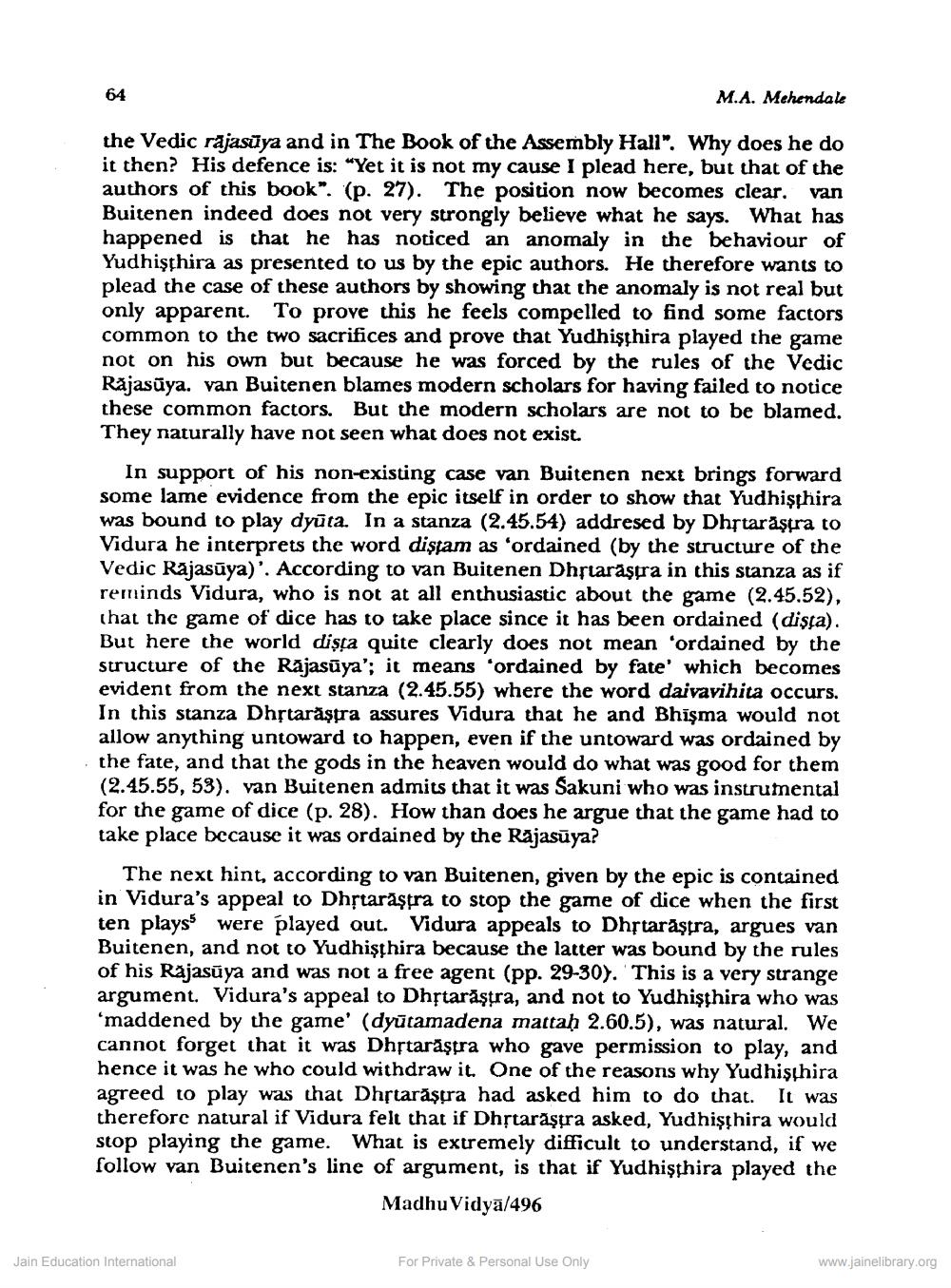________________
64
M.A. Mehendale
the Vedic rājasüya and in The Book of the Assembly Hall". Why does he do it then? His defence is: "Yet it is not my cause I plead here, but that of the authors of this book". (p. 27). The position now becomes clear. van Buitenen indeed does not very strongly believe what he says. What has happened is that he has noticed an anomaly in the behaviour of Yudhişthira as presented to us by the epic authors. He therefore wants to plead the case of these authors by showing that the anomaly is not real but only apparent. To prove this he feels compelled to find some factors common to the two sacrifices and prove that Yudhişthira played the game not on his own but because he was forced by the rules of the Vedic Rajasūya. van Buitenen blames modern scholars for having failed to notice these common factors. But the modern scholars are not to be blamed. They naturally have not seen what does not exist.
In support of his non-existing case van Buitenen next brings forward some lame evidence from the epic itself in order to show that Yudhişthira was bound to play dyūta. In a stanza (2.45.54) addresed by Dhstaraştra to Vidura he interprets the word dişgam as 'ordained (by the structure of the Vedic Rajasūya)'. According to van Buitenen Dhstaraşgra in this stanza as if reminds Vidura, who is not at all enthusiastic about the game (2.45.52), that the game of dice has to take place since it has been ordained (dista). But here the world disa quite clearly does not mean "ordained by the structure of the Rajasūya'; it means 'ordained by fate' which becomes evident from the next stanza (2.45.55) where the word daivavihita occurs. In this stanza Dhstarāşpra assures Vidura that he and Bhīşma would not allow anything untoward to happen, even if the untoward was ordained by the fate, and that the gods in the heaven would do what was good for them (2.45.55, 53). van Buitenen admits that it was Sakuni who was instrumental for the game of dice (p. 28). How than does he argue that the game had to take place because it was ordained by the Rājasūya?
The next hint, according to van Buitenen, given by the epic is contained in Vidura's appeal to Dhstarāştra to stop the game of dice when the first ten plays were played out. Vidura appeals to Dhstarăşura, argues van Buitenen, and not to Yudhişthira because the latter was bound by the rules of his Rajasūya and was not a free agent (pp. 29-30). This is a very strange argument. Vidura's appeal to Dhstarăştra, and not to Yudhişthira who was ‘maddened by the game' (dyūtamadena mattaḥ 2.60.5), was natural. We cannot forget that it was Dhstaraşpra who gave permission to play, and hence it was he who could withdraw it. One of the reasons why Yudhisthira agreed to play was that Dhstarăşıra had asked him to do that. It was therefore natural if Vidura felt that if Dhstaraşıra asked, Yudhisthira would stop playing the game. What is extremely difficult to understand, if we follow van Buitenen's line of argument, is that if Yudhisthira played the
Madhu Vidyā/496
Jain Education International
For Private & Personal Use Only
www.jainelibrary.org




